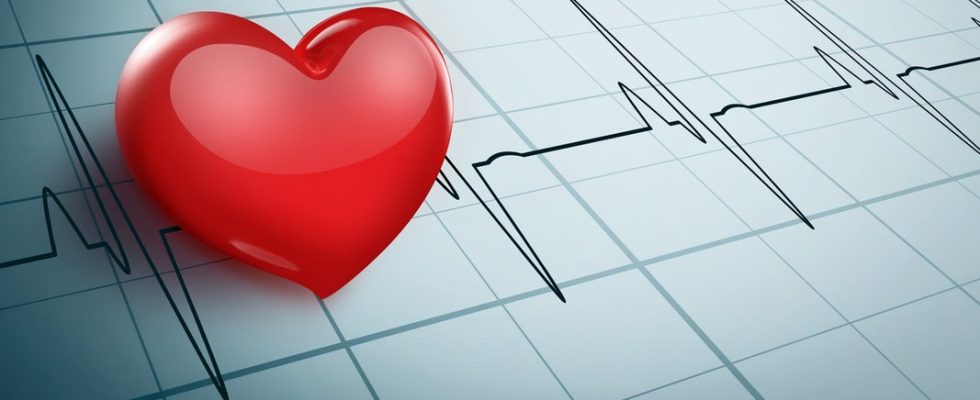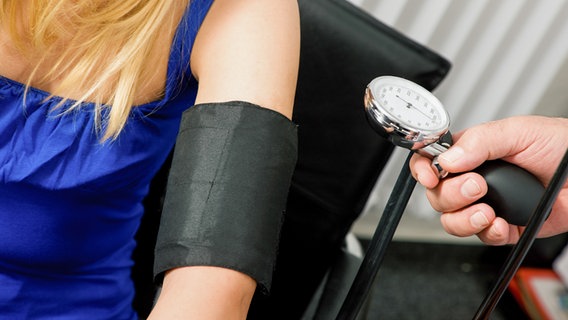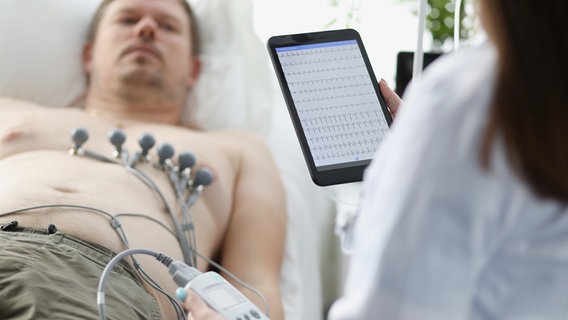As of: October 16, 2023 9:26 a.m
Tachycardia, commonly known as palpitations, can have a variety of causes. If your heart beats faster than normal, it can be frightening, especially if it occurs when you are lying down or standing up. What to do?
The heart normally pumps blood throughout the body at a stable rhythm of 60 to 90 beats per minute to ensure that all organs receive an adequate supply of oxygen and nutrients. If the heart suddenly beats much faster without physical exertion, this is called palpitations or tachycardia – heart rates of 140 to 180 or more can be reached. If those affected feel dizzy, restless or have pressure on their chest, the racing heart can be frightening.
Heart palpitations: These are possible causes
There are a number of causes of tachycardia, ranging from stress to too much caffeine to serious illness. A fast heartbeat is not always threatening – in many cases it is temporary and harmless. However, if your heart palpitations occur repeatedly or suddenly, you should definitely seek medical examination in order to determine the exact cause and, if necessary, initiate treatment. For example, heart palpitations can have the following causes:
- Stress and excitement: In stressful or exciting situations, the body releases hormones that stimulate the heart to beat faster. This is a natural reaction (“fight-or-flight response”) that prepares the body to act quickly.
- Caffeine, alcohol and drugs: Caffeine can also make the heart race. It is found in coffee, black and green tea, and energy drinks, among other things. Caffeine stimulates the nervous system and can temporarily speed up the heart. Alcohol and certain drugs can also cause heart palpitations.
- Atrial fibrillation: In cardiac arrhythmias, the heart’s electrical system is temporarily disrupted, which can cause it to beat irregularly. These disorders can be congenital or occur throughout life. A fast, irregular heartbeat, for example, can indicate atrial fibrillation – this means that the atria of the heart no longer contract properly, they just “flicker”. Atrial fibrillation is not acutely dangerous, but blood clots can form that can trigger a stroke. Therefore, the cardiac arrhythmia must be treated medically.
- Heart disease: In coronary heart disease, the coronary arteries are narrowed as a result of atherosclerosis. This circulatory disorder can lead to a heart attack or ventricular tachycardia. The faster the heart beats, the more threatening this cardiac arrhythmia becomes. If it beats at a frequency of around 240 beats per minute, life-threatening ventricular fibrillation occurs. In Wolff-Parkinson-White syndrome (WPW), an additional stimulus conduction between the atrium and ventricle is present from birth. This excites the heart incorrectly, which can lead to palpitations. The cardiac arrhythmia can be treated by obliterating the additional line. In AV node reentrant tachycardia, there is an altered or additional conduction in the area of the AV node. This causes circular excitations to spread between the atria and the ventricle, resulting in a greatly accelerated pulse.
- Hyperthyroidism: Heart palpitations can also be caused by an overactive thyroid. The thyroid regulates metabolism. When the thyroid gland is overactive, it releases increased hormones that affect the entire body and especially the heart.
- Hormonal changes: During menopause, for example, heart palpitations can occur due to hormonal changes. Medication can help. During pregnancy, the increased volume of blood that needs to be pumped through the body can be responsible for an increased heart rate.
In order to clarify the causes of palpitations, resting and stress ECGs, a long-term ECG and a cardiac ultrasound (cardiac echo) are usually carried out after a detailed discussion. A special electrophysiological examination (EPU) via catheter is often also required to find the cause. If a heart disease is the reason for the racing heart, it can be treated with medication or a so-called Catheter ablation can be treated. Cardiac muscle cells that cause the heart to race are destroyed using a catheter.
What to do if you have benign tachycardia?
Benign palpitations often end as suddenly as they began. However, if it persists, deep breathing or drinking cold, preferably carbonated water can stop the racing heart. To prevent benign tachycardia, one should avoid stress and use relaxation techniques. A healthy lifestyle with enough exercise and good nutrition is also recommended. However, if the suffering is too high due to recurring attacks, medication or catheter ablation can provide relief.
Experts on the topic
Further information




